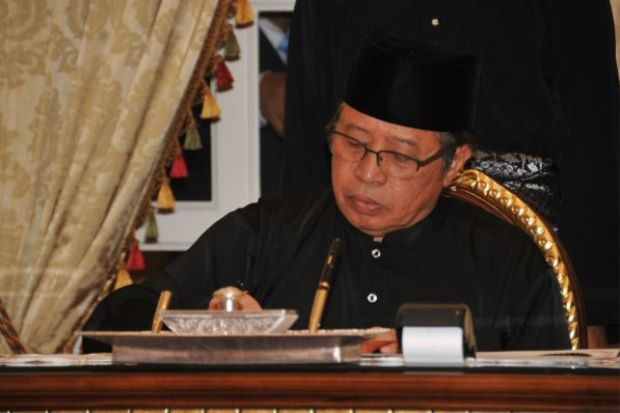Sarawak vote to call its leader 'premier' could be first step to greater autonomy
Sign up now: Get insights on the biggest stories in Malaysia

A 2017 photo shows Mr Abang Johari Openg signing the oath of office as Sarawak’s sixth chief minister.
PHOTO: THE STAR/ASIA NEWS NETWORK
The chief minister of Sarawak will be known as Sarawak premier, after the state tabled and passed an amendment Bill on Tuesday (Feb 15), in what analysts say could be the first step towards maximising the state's autonomy of governance in Malaysia.
The amendment passed at the second time of asking, with 67 assemblymen voting in support, after the first count was short of the required two-thirds majority of 55 supporting votes.
Gabungan Parti Sarawak (GPS) lawmakers hold 76 of 82 seats in the Sarawak state assembly.
The vote means that the state's hitherto chief minister Abang Johari Openg will officially be known as the state's premier in written law.
Dr James Chin, professor of Asian studies at the University of Tasmania in Australia, said it was a sign that Sarawak is heading to "maximum autonomy" under the Malaysian federation.
"Sarawak is basically sending a signal to the states in peninsula Malaysia that... Sarawak and Sabah are no longer mere states like them. Sarawak is saying 'we are different'," he said, adding that Sabah will soon follow Sarawak's move.
Dr Chin, who was born in Sarawak's capital Kuching, told The Straits Times that Sarawak was emboldened now and may look at further changes to "more substantive" issues.
He did not elaborate but Sarawak had previously been involved in legal disputes with Malaysia's national energy giant Petronas over a higher revenue share of oil and gas produced in the state.
The tussle was widely believed to have led to Petronas' former chief executive quitting his role in 2020 after a disagreement with then Prime Minister Muhyiddin Yassin over giving more oil money to Sarawak.
Professor Lee Kuok Tiung, associate professor of communications at Universiti Malaysia Sabah, said the amendment Bill is "just another (form of) pressure Sarawak is applying on the federal government for more autonomy" and that the state will not stop there.
When asked if Sabah would soon follow suit, Prof Lee said "it would not be easy", given the state government would need a two-thirds majority to amend its constitution.
He said: "Sarawak did it because they have the two-thirds majority, but Sabah doesn't have it."
Some politicians saw the change of title as symbolic.
Democratic Action Party assemblyman Chong Chieng Jen, one of six opposition lawmakers who voted against the Bill, said it is a redundant exercise as it does not give the premier any extra powers nor status outside the state.
"You step outside the state, you are still regarded as the chief minister," he told the assembly.
Malaysia's de facto law minister Wan Junaidi Tuanku Jaafar, who is lawmaker for Santubong in Sarawak, compared the choice of nomenclature to Australia, where its state leaders are also known as premiers.
Dr Jayum Jawan, professor of political science at Universiti Putra Malaysia, said the change was anticipated, adding that he hoped with the constitutional amendment at the state level, there will be " more substantive policies and programmes".
"I would want to see how they address the many grievances that have been aired over the last many years and especially highlighted in the campaigns during the last general elections," he added.
The change would reflect Sarawak in the "proper perspective" as one of the founding regions of Malaysia, alongside peninsula Malaya and Sabah, wrote Tourism, Creative Industry and Performing Arts Minister Abdul Karim Hamzah on his blog a day before the amendment was passed. Another founding member Singapore gained independence in 1965.
On Tuesday, Sarawak's state assembly also passed another Bill that will allow children of mixed-race marriages to be considered indigenous if either of their parents is a state native.
Around 35 per cent of children in Sarawak were born to mixed-race parents, according to Mr Junaidi, and they had problems with matters such as land inheritance before the law change.
Indigenous races, known as bumiputera in Malaysia, enjoy privileges including access to land reserved for natives, a prioritised quota for places in public universities and a 30 per cent entitlement to the equity of any public listed company in the country.
A further amendment to rename the state's 36 "assistant ministers" as "deputy ministers" was also passed, and they can be invited to state Cabinet meetings at the invitation of the premier.
Malaysia amended its constitution last year to recognise Sarawak and Sabah as two of three entities that made up the country, with the third being the remaining states on the peninsula. Sabah and Sarawak had previously been defined only as two of the country's 13 states.
This reversed a 1976 amendment - which was then agreed to by all Sarawak and Sabah MPs present in Parliament - which listed all 13 states together.
Although largely semantic, the language used from 1976 to 2020 is viewed as a symbol of how Sarawak and Sabah's autonomy in areas such as managing natural resources, the civil service and immigration have been diluted.


